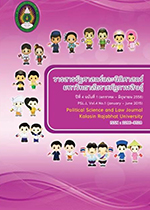แนวคิดรัฐ-เขตแห่งวัฒนธรรม : ข้อเสนอบนความหลากหลายทางชีวชาติพันธุ์และความหลากหลายทางวัฒนธรรมของชนชาติพื้นเมือง
DOI:
https://doi.org/10.14456/gjl.2015.3คำสำคัญ:
ชนชาติพื้นเมือง, รัฐชาติ, รัฐแห่งวัฒนธรรม, indigenous peoples, nation state, cultural stateบทคัดย่อ
ความแตกต่างของสิ่งแวดล้อมทั้งทางกายภาพและชีวภาพ ในเขตชีวภูมิศาสตร์ต่างๆ เป็นปัจจัยสำคัญที่ทำให้เกิดความแตกต่างทางชีว-ชาติพันธุ์และวัฒนธรรมของมนุษย์ ความแตกต่างดังกล่าว เป็นมรดกที่มีคุณค่า ซึ่งธรรมชาติได้สร้างสรรค์ขึ้น ให้เป็นสมบัติอันล้ำค่าของระบบนิเวศโลก การจัดระเบียบมนุษย์เผ่าพันธุ์ต่างๆ โดยมนุษย์เพียงบางกลุ่ม ภายใต้กระบวนทัศน์รัฐชาติ ในหลายทศวรรษที่ผ่านมา ได้ก่อให้เกิดการสูญเสียความหลากหลายทางวัฒนธรรมและเผ่าพันธุ์บทความนี้กล่าวถึง ความหลากหลายทางชาติพันธุ์ ความเป็นมาของรัฐชาติ และสถานการณ์ชนชาติพื้นเมืองภายใต้รัฐชาติ เสนอแนะทางออก เพื่อการพยุงรักษาความหลากหลายทางเผ่าพันธุ์และวัฒนธรรมและลดความขัดแย้งระหว่างเผ่าพันธุ์ภายใต้ข้อจำกัดเดิม ด้วยกระบวนทัศน์ใหม่ “รัฐแห่งวัฒนธรรม-เขตแห่งวัฒนธรรม” บนพื้นฐานในเรื่องสิทธิแห่งความเสมอภาคของมนุษยชนThe differences of physical and biological factors in the world ecosystem affected a diverse bio-ethnical and human culture. The diversity of indigenous people and culture was a highly valuable heritage, which was created by our nature. The management of various tribal people by some human under the nation-state paradigm in the last decades resulted in the loss of cultural diversity and ethnic groups. This article discusses the evolution of state and talks about the situation of indigenous people under the nation-state. Also, this paper suggests an alternative way for maintaining the diversity of ethnic groups, cultures and for reducing conflict among ethnic groups within a new paradigm “the cultural state-cultural sphere” based on the rights of equality of human rights.
Downloads
ดาวน์โหลด
เผยแพร่แล้ว
รูปแบบการอ้างอิง
ฉบับ
ประเภทบทความ
สัญญาอนุญาต
ลิขสิทธิ์ (c) 2017 วารสารการบริหารปกครอง (Governance Journal)

อนุญาตภายใต้เงื่อนไข Creative Commons Attribution-NonCommercial-NoDerivatives 4.0 International License.








